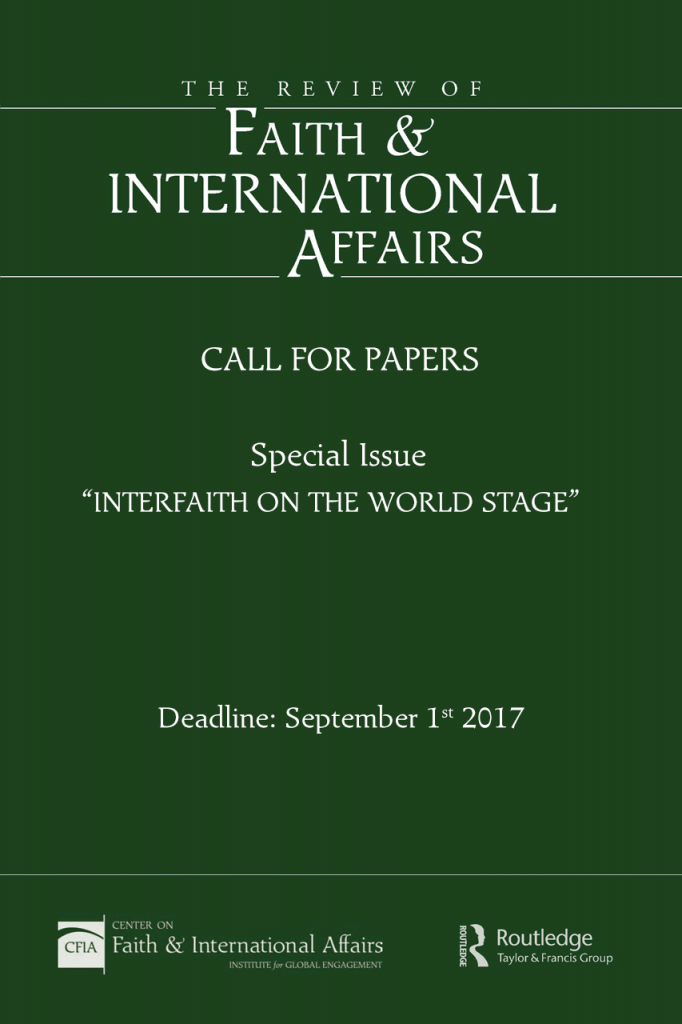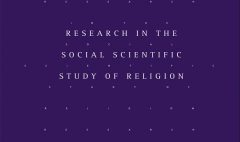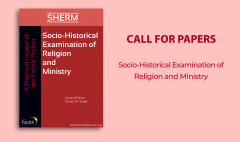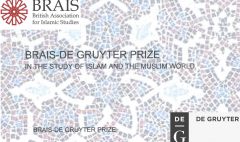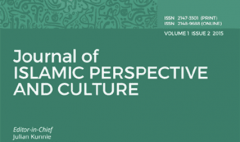Special Issue: “Interfaith on the World Stage”
July 24, 2023 2023-10-08 8:19Special Issue: “Interfaith on the World Stage”
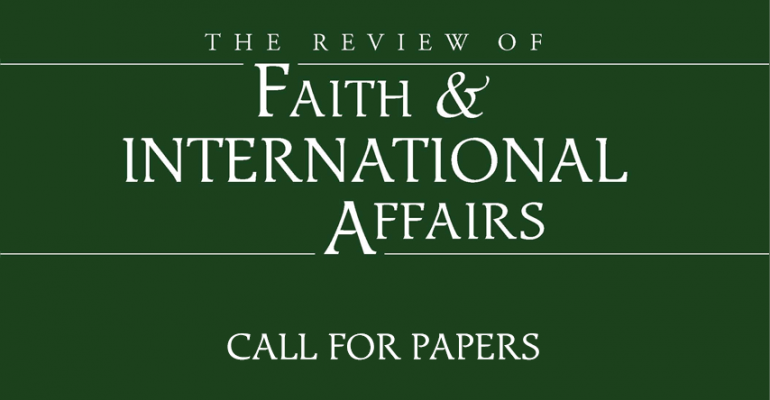
Special Issue: “Interfaith on the World Stage”
Call for Papers
Special Issue of The Review of Faith & International Affairs
Editors: John Fahy and Jeffrey Haynes
Publisher: Taylor & Francis
Abstract Submission Deadline: September 1, 2017
The Review of Faith & International Affairs is a quarterly journal dedicated to providing analysis and commentary regarding the role of religion – for good or ill – in global affairs. The Review of Faith & International Affairs brings together many of today’s most innovative and distinguished thinkers, making their research and commentaries available not just to specialists but to a wider audience of globally concerned readers. The Review of Faith & International Affairs is published out of the Center on Faith & International Affairs (CFIA) at the Institute for Global Engagement.
We are pleased to announce the call for papers for the upcoming special issue of The Review of Faith & International Affairs on the theme of ‘Interfaith on the World Stage’. This special issue will be co-edited by John Fahy (Georgetown University, Qatar & Woolf Institute, Cambridge) and Jeffrey Haynes (London Metropolitan University).
Please send abstracts (up to 200 words) to John Fahy atjef96@georgetown.edu by September 1st 2017.
Outline
In the wake of the events of 9/11 there has emerged a now significant body of literature that seeks to account for the ‘return’ or ‘resurgence’ of religion in international relations (Fox & Sandler 2004, Snyder 2011, Fitzgerald 2011, Haynes 2012, Sandal & Fox 2013, Hunter 2016).
Against a backdrop of secularization theory, and often framed by historical processes such as globalization and democratization, this literature typically attributes religion’s marginalization in global politics to Westphalian-informed assumptions that continue to pervade international relations today. Arguing that religion’s role in international relations can no longer be ignored, scholars have engaged with case studies as diverse as Buddhism in Sri Lanka, Shi’a Islam in Iran and Christian fundamentalism in the United States, to name but a few examples.
Insofar as this literature focuses on particular religious traditions, however, a critical blind spot has developed whereby the contemporaneous proliferation of transnational interfaith (or multifaith, interreligious) initiatives has often been overlooked (cf. Braybrooke 1992, Marshall 2013). This special issue addresses this oversight by exploring the role of interfaith actors, organizations and initiatives in the broader re-emergence of religion in international affairs.
Although the interfaith movement can be traced back to the late 19th century, it gained unprecedented prominence in the years following 9/11. Interfaith initiatives were enlisted as part of wider multiculturalist responses to the threat of radicalization in liberal democracies such as the United States, the UK and Australia.
In the Middle East interfaith events came to represent important platforms for the promotion of ‘true’ or ‘moderate’ Islam, and continue to serve as valuable opportunities to counter the ‘clash of civilizations’ discourse that informs relations between the Islamic world and the West. In the last decade or so the United Nations has recognized interfaith actors and organizations as close allies, passing several important resolutions, for example, on ‘the promotion of interfaith dialogue’ (2004). Since 2011 the first week of February every year marks U.N. World Interfaith Harmony Week.
There are today dozens of interfaith organizations whose activities and agendas transcend national borders. Although their goals are as diverse as peace-building, conflict resolution, combating extremism, tackling poverty and addressing climate change, they share a common commitment to the idea that the world’s most pressing issues must be responded to not by side-lining, but by engaging, the world’s religious traditions.
Interfaith has come to represent a particular mode of faith-based diplomacy (Johnston 2003), or what we might call ‘faiths-based diplomacy’, within which religion occupies a privileged rather than a peripheral place in international relations. There remains significant disagreement, however, as to the effectiveness of interfaith efforts. In contributing to debates that cohere around the broader resurgence of religion in international relations, this special issue fills an important gap in the literature by exploring the emergence of interfaith on the world stage.
Source: ISA Research Committee 22


